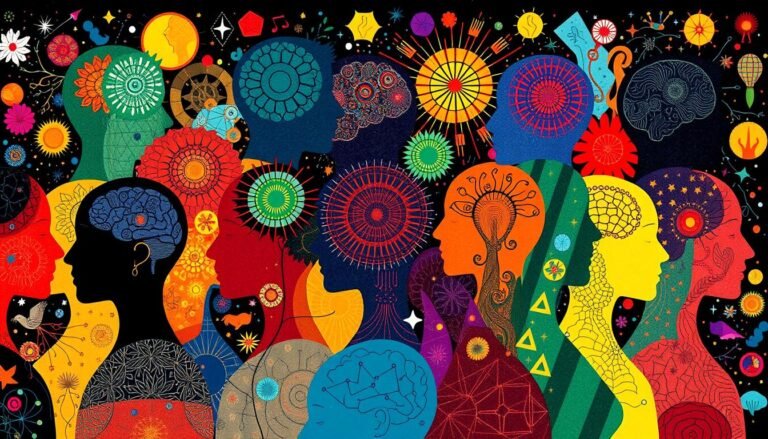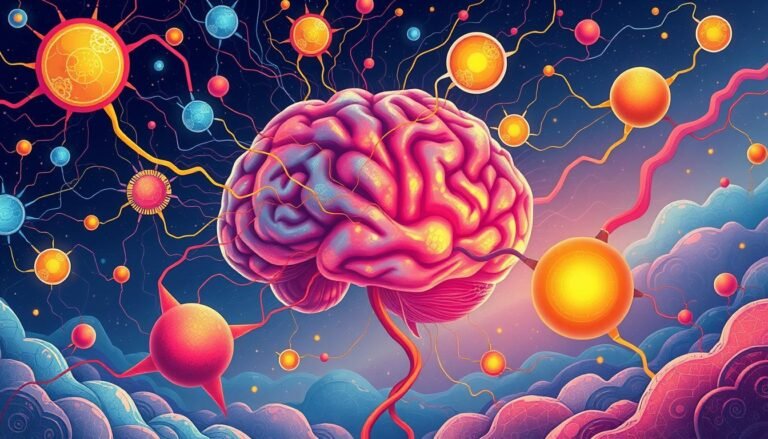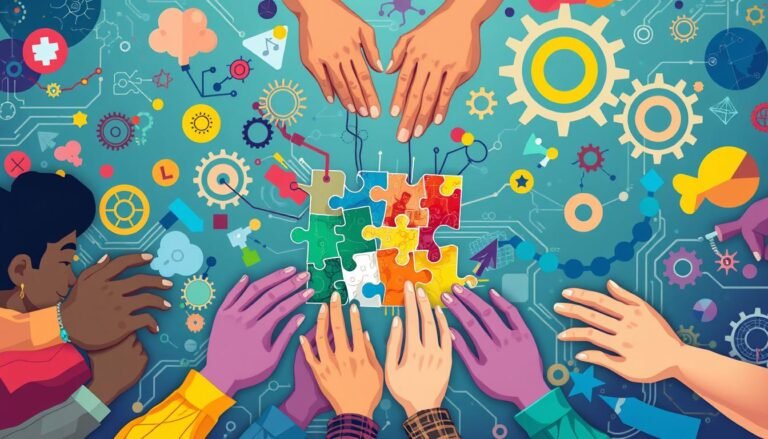Trust and Betrayal Psychology
Trust is the foundation of human relationships. It’s crucial in our daily lives, from personal to professional interactions. The study of trust and betrayal explores how we form bonds and deal with broken promises.
Emotional intelligence is key in understanding trust. It helps us read social cues and decide who to trust. Trust makes our interactions smoother and encourages cooperation in relationships.
Betrayal can shake our world view. The pain of betrayal makes us rethink our relationships and values. Yet, we still seek trust-based connections, showing our need for social bonds.
Learning about trust and betrayal helps us build stronger relationships. It gives us tools to heal from betrayal and trust wisely in the future. This knowledge is vital for healthy relationships and well-being.
Key Takeaways
- Trust is essential for human well-being and social interactions
- Emotional intelligence aids in navigating trust dynamics
- Betrayal can significantly impact one’s ability to trust
- Humans have an innate need for trust-based connections
- Understanding trust and betrayal helps build stronger relationships
- Wise trust involves assessing betrayal probability and human frailty
- Recovery from betrayal is possible with self-compassion and time
The Foundation of Trust in Human Psychology
Trust is at the heart of human psychology, shaping our mental health and society. It’s key in our relationships and daily life.
The Role of Trust in Mental Wellness
Trust greatly affects our mental health. It lowers anxiety and depression, making us feel secure in our bonds. But, when trust is broken, it can cause betrayal trauma, harming our well-being. Building trust is vital for healthy connections and emotional balance.
Evolutionary Basis of Trust
Our ability to trust has deep roots in evolution. It helped our ancestors form strong groups, boosting survival. Today, trust is still crucial in our social lives, shaping how we deal with complex relationships and structures.
Trust’s Impact on Civilization
Trust holds civilization together. It makes our daily interactions, from personal to professional, smoother. Without trust, these activities would be hard to manage. Repairing trust is key when it’s broken, ensuring society keeps moving forward.
“Trust is the glue of life. It’s the most essential ingredient in effective communication. It’s the foundational principle that holds all relationships.”
Understanding trust’s role in psychology and its wide effects helps us build stronger bonds and societies. By valuing trust, we can create more rewarding relationships and a stronger community.
Trust and Betrayal Psychology: Core Concepts and Theories
Trust and betrayal psychology explores the complex world of relationships. It looks at how emotional intelligence and attachment styles affect our trust in others. The study starts with how early life experiences shape our adult relationships.
Betrayal trauma happens when someone we trust hurts us. This can cause long-lasting emotional pain and even PTSD-like symptoms.
In 1991, psychologist Jennifer Freyd coined the term “betrayal trauma.” She said it’s trauma in key social relationships where we depend on the betrayer. This shows how broken trust can deeply affect our mental health.
“Betrayal in romantic relationships can result in loss of self-esteem, anger, guilt, depression, anxiety, and intrusive thoughts about the affair.”
The effects of betrayal trauma are wide-ranging. They can include physical pain, panic attacks, and trouble managing feelings. Getting better often needs professional help and takes a lot of time.
| Professional Group | Continuing Education Credits |
|---|---|
| Addiction Counselors | 3.0 clock hours |
| Florida Social Mental Health Counselors | 3.0 credits |
| New York Counselors | 3.5 contact hours |
| Illinois Marriage & Family Therapists | 3.0 credits |
| Nurses and Clinical Nurse Specialists | 3.0 self-study contact hours |
| Canadian Psychologists | 3.0 self-study continuing education hours |
Knowing these core ideas is key for mental health professionals. It helps them understand and support people dealing with trust and betrayal issues in their relationships.
The Three Patterns of Trust Response
Trust and betrayal psychology shows three main ways we respond to trust. These patterns affect how we interact and our emotional health.
Blind Trust: The Denial Response
Blind trust ignores risks in relationships. People with this response overlook warning signs. This makes them open to betrayal.
This pattern comes from a wish to avoid conflict or fear of being alone.
Suspiciousness: The Hypervigilant State
Suspiciousness is the opposite. It makes people always watchful and isolated. They find it hard to connect with others because they see threats everywhere.
Wise Trust: The Balanced Approach
Wise trust is the best way to handle trust and betrayal. It balances the risk of betrayal with the ability to connect. This way, we see human weaknesses but don’t let them ruin our relationships.
Knowing these patterns helps us grow emotionally. By understanding our trust response, we can aim for a balanced approach. This leads to better relationships and mental health.
| Trust Response | Characteristics | Impact on Relationships |
|---|---|---|
| Blind Trust | Ignores risks, overlooks warning signs | Vulnerability to betrayal |
| Suspiciousness | Constant vigilance, perceives threats | Difficulty forming connections |
| Wise Trust | Balanced assessment, acknowledges human nature | Fosters healthy relationships |
By focusing on wise trust, we can better handle human interactions. This boosts our emotional intelligence and helps us deal with betrayal.
Understanding Betrayal Trauma
Betrayal trauma hits hard at our most precious relationships. It happens when someone we trust betrays us, leaving us feeling broken and unsure. This trauma deeply affects our mental health and emotional state.
Clinical Definition and Origins
Jennifer Freyd, PhD, first talked about betrayal trauma in 1991. It’s about when someone we count on betrays us. This can be from childhood abuse or in adult relationships.
Impact on Mental Health
Betrayal trauma has big effects. People often face PTSD, depression, anxiety, and trust problems. They might also struggle with emotional control and turn to drugs or alcohol. Physical issues like pain and eating disorders are common too.
Types of Betrayal
Betrayal trauma takes many forms. In kids, it’s often from abuse or neglect. For adults, it can be physical or emotional abuse, cheating, or hiding money. Each type can deeply hurt, affecting our future relationships and well-being.
“Recovery from betrayal trauma is possible. It involves acknowledging the betrayal, understanding attachment styles, and building secure relationships. With support and the right strategies, healing can begin.”
It’s key to understand betrayal trauma for recovery. By facing it and getting help, we can start healing and rebuild trust. Growing emotional intelligence helps us deal with complex feelings and build better relationships.
The Neuroscience of Trust and Betrayal
The brain’s reaction to trust and betrayal is quite interesting. Studies in Trust and Betrayal Psychology show how our brains handle these feelings. They found special brain activities when we cooperate or when we feel betrayed.
A study in The Journal of Neuroscience looked into why we trust others. It found that we feel better when we trust our friends than strangers or machines. Brain scans showed that trusting a friend activates certain brain areas.
Our brains are quicker to adjust to cooperation than to betrayal. Over time, we get better at working with people we trust. This helps us build strong relationships in our personal and work lives.
Betrayal, however, makes our brain think danger is everywhere. It can make us always on guard and hard to trust others. This can make us doubt ourselves and our relationships.
Knowing how our brains work with trust and betrayal is key. It helps us understand ourselves and others better. By understanding these brain processes, we can improve our relationships and emotional intelligence.
Attachment Styles and Their Influence on Trust
Attachment styles shape our relationships and how we trust others. These patterns start in childhood and affect our emotional intelligence and adult connections.
Secure Attachment Patterns
Those with secure attachment styles trust easily. They feel safe and can form strong bonds. This comes from good caregiving in childhood, leading to self-confidence and trust in others.
Insecure Attachment Types
Insecure attachment shows in three ways:
- Anxious Attachment: Fear of being left and needing constant reassurance
- Avoidant Attachment: Uncomfortable with closeness and hard to trust others
- Disorganized Attachment: Wanting closeness but also distance
A study of 261 people in relationships found attachment anxiety affects trust and jealousy. Those with anxious attachment feel more jealous when trust is low.
Healing Attachment Wounds
Knowing your attachment style is key to better relationships. Therapy can help change insecure patterns. By becoming more self-aware and challenging old beliefs, you can trust others more securely.
“Understanding your attachment style can transform your relationships and boost your emotional intelligence.”
Books on attachment theory give insights into how early experiences shape adult relationships. By using this knowledge, you can build stronger, more trusting connections and improve your emotional well-being.
Building and Rebuilding Trust
Fixing trust takes time, kindness, and understanding of emotions. It’s hard to get back after trust is broken. But, with the right steps, you can make your relationships stronger.
Self-Compassion Techniques
Being kind to yourself is key in healing from trauma. It means being gentle and understanding, knowing we all make mistakes. Try to find value and purpose in your life, not just because of the betrayal.
Trust Assessment Strategies
It’s important to know how to assess trust in relationships. Look at how people handle being open and taking care of themselves. Dr. John Gottman’s work shows that being empathetic and understanding is crucial, especially from the person who hurt you.
Recovery Timeline
How long it takes to rebuild trust varies. A 2022 study in Evolutionary Psychology shows the value of understanding each other’s needs and talking openly. Building trust slowly can lead to stronger, lasting relationships.
“Trust is rebuilt through actions, not just words, after infidelity.” – The Gottmans
Rebuilding trust means doing the right thing consistently, being open, and growing as a person. Therapy can help you deal with your feelings and learn new ways to connect with others. With effort and patience, you can come out of betrayal with stronger, more lasting bonds.
The Role of Emotional Intelligence in Trust
Emotional intelligence is crucial for building and maintaining trust. It involves understanding your own emotions and those of others. This skill is essential in navigating the complex world of trust and betrayal.
Studies reveal how emotions influence trust. For example, feeling good can make us more trusting of strangers. However, betrayal can lead to anger or shame, making it hard to trust again. It’s challenging to regain the trust we once had.
Those with high emotional intelligence can recognize trust and betrayal signs. They grasp the reasons behind broken trust. This ability helps in forming stronger relationships. In workplaces, trust fosters better teamwork and reduces the need for strict rules.
Emotional intelligence also aids in recovering from betrayal. It equips us with strategies to handle disappointment and anger. This skill is vital for healing and moving forward. With time and effort, we can learn to trust wisely again. Boosting emotional intelligence leads to healthier, more trusting relationships in all areas of life.
Source Links
- Trust and Betrayal
- Betrayal and Human Relationships
- How Our Brains Adapt To Trust And Betrayal
- Betrayal of Trust
- Love to Deceit: Deciphering Betrayal’s Psychology<br/> — The Haven
- The Science of Trust and Betrayal with John Gottman, Ph.D.
- Betrayal Trauma: Signs and How to Start Healing
- Trust and Betrayal in the Workplace – Confident Change Management
- Definition of Betrayal Trauma Theory
- The Cause and Effect of Partner Betrayal Trauma
- Betrayal Trauma—The Impact of Being Betrayed
- Betrayal trauma: Impact, causes, and recovery
- The Neuroscience of Trust
- Mindset, Betrayal and the Brain – Michelle Mays
- Your Attachment Style Influences the Success of Your Relationship
- The Price of Distrust: Trust, Anxious Attachment, Jealousy, and Partner Abuse
- How to Rebuild Trust After Betrayal in a Relationship
- 6 Steps to Rebuilding Trust After Betrayal
- The 8 Step Process Of Rebuilding Trust After Cheating—By A Psychologist
- Microsoft Word – Revised Dr. SELART(2)-TOPSYJ.docx
- Chapter 1








